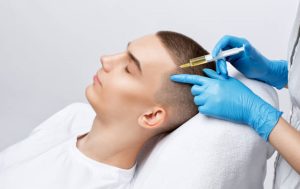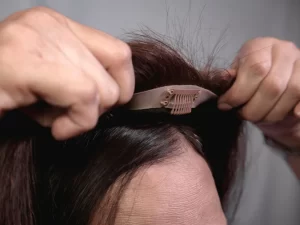
Ah, hair! The crowning glory of our appearance. But what happens when the mane starts to thin? It’s like watching a horror movie unfold in your own head. It’s not just about vanity; hair loss can also indicate underlying health issues. A DHT test could be the detective you need to solve this hairy mystery. Let’s explore what testing for DHT levels can reveal about the potential causes of hair loss and why understanding these culprits is paramount in reclaiming your luscious locks.
1. The Link Between DHT and Hair Loss
First, let’s talk about DHT. Dihydrotestosterone (DHT) is a hormone that’s derived from testosterone, and it’s a big player in the game of hair loss. When there’s too much DHT, it shrinks the hair follicles, making it harder for hair to survive. Think of DHT as the villain in a movie, and your hair follicles are the innocent townsfolk. The DHT test steps in to determine the levels of this hormone, giving you a clear picture of what you’re up against. Being informed helps you take the necessary steps to fight this villain before it wreaks havoc on your hair.
2. Unravelling the Genetics of Hair Loss
Have you ever looked at your family tree and noticed a pattern of baldness? There’s a good chance genetics is playing a part in your hair loss. It’s called androgenetic alopecia, and it’s the culprit behind most cases of hair thinning. The DHT blood test can reveal if your DHT levels are through the roof, helping you and your doctor understand if genetics is at play. Knowledge is power, right? This insight can help you better prepare for what might lie ahead and take proactive steps to either delay or minimise the effects.
3. Insights into Lifestyle and Dietary Effects
What’s on your plate might be affecting what’s on your head. A diet that lacks essential nutrients or a lifestyle that includes excessive smoking or stress can have an impact on DHT levels. The test will not only measure the levels of the hormone but also shed light on whether it’s time to revamp your lifestyle or diet. A change in habits might just be the knight in shining armour your hair needs. Furthermore, this test could be the wake-up call that inspires you to adopt a healthier lifestyle that not only benefits your hair but enhances your overall well-being.
4. Understanding Other Underlying Health Issues
It’s not all about DHT. Sometimes, other health issues, such as thyroid problems or hormonal imbalances, might be the puppeteers behind the scenes, orchestrating hair loss. A DHT test can rule out high levels of DHT as a cause and prompt further investigation into other underlying issues. It’s like solving a puzzle; sometimes, you need to look beyond the obvious pieces. Through this, you’ll be more equipped to tackle hair loss, knowing the full spectrum of factors contributing to it.
5. Tailoring a Hair Loss Treatment Plan
The final piece of the puzzle is devising a battle plan. Knowing DHT levels through a DHT blood test enables the creation of a targeted treatment plan. It could range from medications and topical treatments to laser therapy or even changes in diet. The key is to tailor the approach based on the insights gained from the test. After all, not every key fits every lock. By having a customised plan, you ensure a more effective and focused approach to dealing with hair loss.
In conclusion, losing your locks can be more than just an aesthetic problem. It can signal the body crying out for help. Whether it’s due to the villainous DHT, genetics, lifestyle choices, or other health issues, a DHT test can be the first step in the journey to reclaiming not just your hair but possibly, your health. With your detective hat on, are you ready to unravel the mysteries behind your receding hairline?





